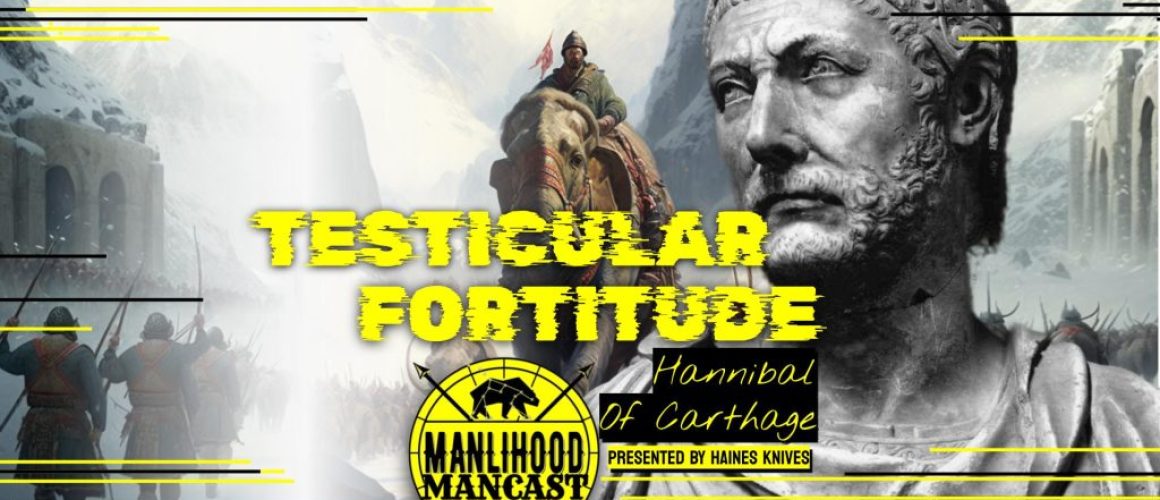Testicular Fortitude: Hannibal of Carthage
This Episode is Brought To you by HAINES KNIVES
Find your new favorite knife at http://HainesKnives.com/mancast or follow on social media @birdforge
Testicular Fortitude means having deep seated masculine courage and strength. Balls. Guts. Manlihood.
Testicular Fortitude on the Manlihood ManCast is where we take a look at men who have beat the odds, men whose courage has left a lasting legacy.
Hannibal of Carthage
The Roman Empire wasn’t a force to mess around with. Their soldiers were ruthless. Their armor and weapons were elite. Their strategy and tactics were forged and tested and refined.
And yet, one North African struck Rome like a hurricane, and we still tell his stories thousands of years later.
Today’s featured man with balls is – Carthaginian General Hannibal.
Carthage was a Phoneician settlement in what is now Tunisia in North Africa. They were building a different kind of empire in the ancient world. They had trading outposts from West Africa to Spain and Portugal to Italy.
The Roman Empire, fueled by their worship of their Caesars, attempted to swallow the world and make it all Rome.
The Carthignians had already suffered defeat against the Romans in the First Punic War. Hannibal’s father was a general on that front.
After the war, his father went to strengthen his family’s wealth by raiding and subjugating the tribes on the Iberian peninsula.
At the age of 9, Hannibal begged his father to take him along.
His father brought him into a sacrificial altar, blazing with fire. (By the way – Carthignians were the descendants of Caananites. They worshipped Ba’al. They often sacrificed their children on these altars. Hannibal’s name actually means, “The lord ba’al is gracious.”)
So Hannibal’s father made him swear an oath at the burning altar.
Hannibal later recounted the oath he had said at the age of nine. “I swear so soon as age will permit…I will use fire and steel to arrest the destiny of Rome.”
Hannibal would continue to fight and lead after his father’s death nine years later. He led troops drawn from the Iberian tribes through the Pyrenees Mountains in 218 BC, then through Gaul, fighting the tribes as he neared the Alps. Some of the tribes ended up leaving their affiliation with Rome and joining forces with him.
Hannibal’s army of 38,000 infantry, 8,000 cavalry, and 38 North African elephants, ventured through the Rhone, and made their way through the alps. Many of those troops and most of those elephants would die along the trek.
They faced numerous difficulties, and according to one historian, they even had to excavate rockfalls on the journey. Using fire to heat the rocks, and then vinegar to douse the rocks, making them split into rubble so it could be cleared.
Hannibal’s army was making a bold and almost outlandish attack.
So crazy it just might work.
Historian Polybius recorded that Hannibal arrived in Italy with 20,000 foot soldiers, 4,000 horsemen, and only a few elephants.
The Punic forces led by Hannibal fought several battles as they worked their way through Italy, but the Roman’s employed a different strategy. Rather than show force, they refused to fight in open battle.
Hannibal conquered towns and pillaged provisions, and Rome fought them by using a battle of attrition – they just tried to drag it out and wear him down.
For several years, Carthage had a strong outpost occupying Roman territory, gradually growing and taking more for themselves. led by the fiercely innovative and unstoppable General Hannibal.
Meanwhile, Rome pushed through Africa. In 203 BC, Hannibal was called back from Italy to fight the Romans on his home turf. The 2nd Punic War came to a close in 201 BC with a tense peace agreement.
Hannibal went on to become a statesman, and as he grew in power and wealth, the Romans sent an armed guard to deal with him. He went into voluntary exile, though he continued to work supporting enemies of Rome in the hopes of overthrowing the empire.
Hannibal caused such distress in ancient Rome, that whenever there was any kind of disaster, the Roman senators would shout, “Hannibal is at the gates!” Romans feared and hated him so much that they built statues of him in the streets to celebrate after his defeat.
Militaries across the world still study Hannibal’s methods. His logistics, his strategies, his tactics, his courage.
And those are the reason that we salute Hannibal today, as a man with Testicular Fortitude!
Testicular Fortitude
Do you have testicular fortitude? Do you want to embrace your life of courage? Join our elite group of powerhouse men who are changing the world. http://Manlihood.com/brotherhood




